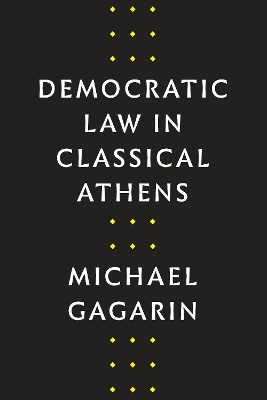
Democratic Law in Classical Athens
Seiten
2020
University of Texas Press (Verlag)
978-1-4773-2037-2 (ISBN)
University of Texas Press (Verlag)
978-1-4773-2037-2 (ISBN)
Controlled entirely by the city-state’s ordinary citizens, the Athenian legal system is one of the most unorthodox the world has ever known, and Michael Gagarin offers an in-depth explanation of how that worked.
The democratic legal system created by the Athenians was completely controlled by ordinary citizens, with no judges, lawyers, or jurists involved. It placed great importance on the litigants’ rhetorical performances. Did this make it nothing more than a rhetorical contest judged by largely uneducated citizens that had nothing to do with law, a criticism that some, including Plato, have made?
Michael Gagarin argues to the contrary, contending that the Athenians both controlled litigants’ performances and incorporated many other unusual features into their legal system, including rules for interrogating slaves and swearing an oath. The Athenians, Gagarin shows, adhered to the law as they understood it, which was a set of principles more flexible than our current understanding allows. The Athenians also insisted that their legal system serve the ends of justice and benefit the city and its people. In this way, the law ultimately satisfied most Athenians and probably produced just results as often as modern legal systems do. Comprehensive and wide-ranging, Democratic Law in Classical Athens offers a new perspective for viewing a legal system that was democratic in a way only the Athenians could achieve.
The democratic legal system created by the Athenians was completely controlled by ordinary citizens, with no judges, lawyers, or jurists involved. It placed great importance on the litigants’ rhetorical performances. Did this make it nothing more than a rhetorical contest judged by largely uneducated citizens that had nothing to do with law, a criticism that some, including Plato, have made?
Michael Gagarin argues to the contrary, contending that the Athenians both controlled litigants’ performances and incorporated many other unusual features into their legal system, including rules for interrogating slaves and swearing an oath. The Athenians, Gagarin shows, adhered to the law as they understood it, which was a set of principles more flexible than our current understanding allows. The Athenians also insisted that their legal system serve the ends of justice and benefit the city and its people. In this way, the law ultimately satisfied most Athenians and probably produced just results as often as modern legal systems do. Comprehensive and wide-ranging, Democratic Law in Classical Athens offers a new perspective for viewing a legal system that was democratic in a way only the Athenians could achieve.
Michael Gagarin is the James R. Dougherty, Jr. Centennial Professor of Classics Emeritus at the University of Texas at Austin. His books include, most recently, The Laws of Ancient Crete, c. 650–400 BCE (with Paula Perlman).
Preface
Introduction
Chapter 1. Democracy
Chapter 2. Performance
Chapter 3. Negotiation
Chapter 4. Rhetoric
Chapter 5. Rules and Relevance
Chapter 6. Justice
Chapter 7. Public Interest
Chapter 8. The Rule of Law
Conclusion
Bibliography
Index Locorum
General Index
| Erscheinungsdatum | 18.03.2020 |
|---|---|
| Reihe/Serie | Fordyce W. Mitchel Memorial Lecture Series |
| Verlagsort | Austin, TX |
| Sprache | englisch |
| Maße | 152 x 229 mm |
| Gewicht | 454 g |
| Themenwelt | Geschichte ► Teilgebiete der Geschichte ► Militärgeschichte |
| Recht / Steuern ► Allgemeines / Lexika | |
| Recht / Steuern ► EU / Internationales Recht | |
| Recht / Steuern ► Rechtsgeschichte | |
| ISBN-10 | 1-4773-2037-7 / 1477320377 |
| ISBN-13 | 978-1-4773-2037-2 / 9781477320372 |
| Zustand | Neuware |
| Haben Sie eine Frage zum Produkt? |
Mehr entdecken
aus dem Bereich
aus dem Bereich
neueste Manipulationstechniken als Waffengattung der NATO
Buch | Softcover (2023)
Westend (Verlag)
24,00 €
Deutschlands Schwäche in der Zeitenwende
Buch | Softcover (2023)
C.H.Beck (Verlag)
18,00 €


